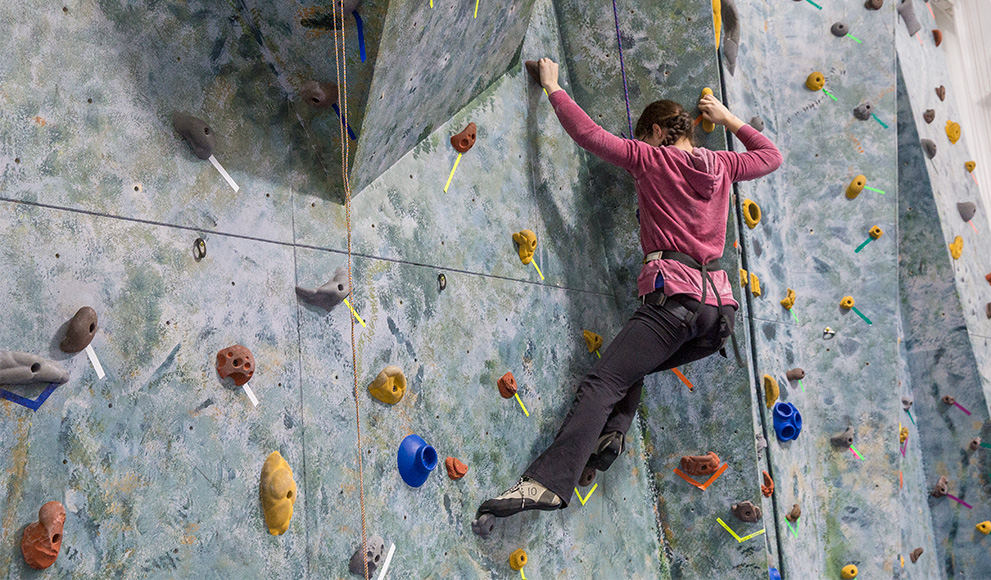More Than A Degree Requirement, Physical Education Is An Essential Part Of A Liberal Arts Education

Wellesley has considered physical education an essential component of a liberal arts education since the College’s founding. “Aerobic activity enhances cognitive function, and aerobic fitness, in particular, relates positively to test scores in mathematics and reading,” said Connie Bauman, professor of the practice in Wellesley’s Physical Education, Recreation, and Athletics Department (PERA). “Our inclusion of PE as one of three degree requirements sends a strong supporting message to students that physical fitness supports cognitive performance.”
Other schools that send that message include Harvard, MIT, Cornell, Davidson College, and Swarthmore College. Yet nationwide, 60 percent of colleges and universities have abandoned their PE requirement, according to a 2013 study.
PERA develops students’ knowledge and skills regarding physical education, which involves kinesiology, exercise physiology, biomechanics, and motor learning. “Students don’t think about the science behind their movement, but we intentionally increase their awareness of the scientific foundations of human motion in our classes,” said Bauman, who has taught at the College since 1979. “Knowing how to exercise properly is an essential part of learning lasting healthy behavioral patterns.”
Students can choose from 45 different activities that range from Indian Kathak dance to tai chi to triathlon training. “Our program emphasizes finding an engaging activity that can be enjoyed throughout the student’s lifetime,” said Bauman.
Some popular courses, such as Couch to 5K, Zumba, yoga, and Pilates, have sections that are for first-year-students only which are designed to help ease the transition to college life by creating small, supportive groups where participants interact with one another. “We focus on building team spirit, building relationships, and creating social networks for exercising outside of class,” said Bauman. “Students enjoy an informal setting where they can laugh together and share, and learn ways to prioritize their overall health and well-being.”
First-year-only courses also teach strategic wellness skills in four key areas: mindfulness, healthy eating, getting adequate sleep, and time management. Over the past four years, PE faculty have worked with the Health Service, the Stone Center Counseling Service, and the Pforzheimer Teaching and Learning Center to develop these wellness presentations. “The healthier we are, the better learners we will be,” said Bauman.
Often, the benefits of movement can be seen in a matter of weeks. “We have had great success with first-years going from a sedentary lifestyle to running 5Ks,” said Bauman. “As their fitness level increases, so does their self-confidence.”
Wellesley also offers intensive training in a number of disciplines, including advanced ballet, boot camp fitness, and advanced strength training.
Other courses work across disciplines to maximize potential benefits—as with fusion fitness, which combines yoga, Pilates, and resistance body training—or to show how various disciplines intersect. Afro-Brazilian dance, for example, combines history, art, and movement. Students learn that slaves who were brought to South America told stories through their music and choreography. Over time, those dances evolved and began to influence the larger culture.
“Cultural dance classes—African, Afro-Brazilian, classical Indian dance—help satisfy diverse interests,” said Bauman. “They also show how exercise adds to the liberal arts experience because students choreograph their own dances at the end of the semester.”
Archery, spinning, self-defense, and rock climbing are perennial favorites. Interest in archery has spiked since the release of the Hunger Games books and movies. “Everyone wants to be Katniss Everdeen,” said Bauman.
Cardio tennis (for those who already have good skills) and barre—which utilizes a ballet barre to improve muscle tone—are new this academic year and provide immediate fitness results. PERA faculty, however, are more interested in facilitating long-term changes that will help students at college and beyond.
Course evaluations suggest that both goals are often achieved. One first-year wrote in her evaluation, “The wellness topics combined with yoga helped me to reduce my stress level. It was also a good opportunity to have fun and meet new people who are now helpful resources for me.” Another student wrote that she enjoyed the choreography in her Zumba class so much that she “even practiced it in [her] dorm.”
Katherine Morris ’17, a mathematics and computer science major, started rock climbing at Wellesley during her first year and now works part-time at a commercial climbing gym. “I love rock climbing because it allows me to relieve stress and have fun while staying physically fit,” she said. “Through climbing, I have learned valuable skills that I can use in the mountains and at all stages of my career.”
Please visit the PERA website for registration deadlines and information.
